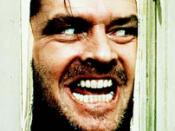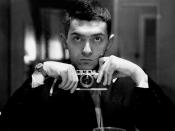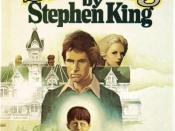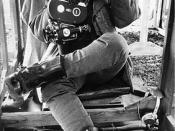In 1977, horror master Stephen King released his third novel, The Shining. The book was "the first widely read novel to cover alcoholism and child abuse in baby-boomer families"� (Amazon). The Shining defined dysfunctional family long before television shows like Married with Children and The Simpsons were even born. Along comes director Stanley Kubrick who has directed such critically praised films as Spartacus and A Clockwork Orange. He decided to take a shot at directing a horror film and felt that The Shining was the perfect choice. Kubrick immediately bought the rights from King. He also hired Jack Nicholson, a very big name at the time, to play the role of the father. Selling the rights was King's vital mistake as Kubrick's version of The Shining, despite its praise, left out vital parts of King's novel. King has made it clear that he was disappointed with the film's outcome and he was given the chance to redeem it in 1996 when ABC Networks gave him the opportunity to write his own screenplay and choose his own director for a three-part mini-series to be shown in 1997 (Esquire 22).
Although it has been less acclaimed, the mini-series version stays true to the novel. Since Kubrick made mistakes in casting, relationship portrayal, and simple plot changes in his adaptation, the movie is less effective than the novel and eliminates the bona fide horror in what was a classic work of literature, thus making the mini-series a better overall film.
The story of The Shining told of a child, Danny Torrance, who had the power to read people's minds and to see into both the past and the future. The boy's father, Jack, was a recovering alcoholic who was in dire need of money after his recent firing. When Jack is given the opportunity to take a position as the caretaker of a prestigious hotel for the winter, he does not even think twice and packs up the family for a nice, cozy winter in a desolate inn. What he does not realize is that there are stronger powers than his own in this hotel and that this might not be the right place for a former drunk who has had problems controlling his temper. What ensues is one of the most horrifying tales ever put down on paper and "the true definition of horror,"� as stated by an Amazon.com reviewer (Amazon).
Despite the fact that many feel Kubrick was only adding to the film with his changes, his version was only 146 minutes long. The mini-series, however, was 273 minutes and managed to include everything in the novel, therefore Kubrick obviously subtracted from the movie. Given that Kubrick had to compensate for time constraints, Jack Torrance is viewed as a lunatic from the very beginning of the film. Stephen King's response to the film, "The central problem with Kubrick's version, of course, is that Jack Torrance is unsympathetic,"� (Wright) clearly illustrates King's disapproval. Despite his faÃÂçade, it is clear that Nicholson was not meant to play the role of a man slowly going mad. After all, he is notorious for playing psychopaths in such films as Goin' South and One Flew Over the Cuckoo's Nest, so how could he be expected to not begin as a psychopath. Kenn McCracken explained Nicholson's performance when he said, "Kubrick's hotel is the evil villain, working through a Jack who has no mind of his own and simply waits to be possessed so that Jack Nicholson can be menacing"� (McCracken). Steven Weber, who plays the role of Jack in the mini-series, is not an A-list actor. He does, however, manage to stay true to the character throughout the film and is therefore a much more convincing and affective performer. This is apparent every time Weber's Jack performs an evil act. One second, his face is filled with rage, but he quickly transforms back into the kind and loving father that he is, as he comforts his son and is even reduced to tears. Linda Holland-Toll makes this clear in her critique of the novel, "Jack Torrance is easily one of the most dichotomous and terrifying characters King brings to life. He is at one and the same time a devoted father and husband and an alcoholic homicidal maniac"� (Holland-Toll 3). Nicholson barely ever shows any sympathy to his wife or his son and is not the "devoted father and husband,"� that Holland-Toll describes.
Along with the miscasting of Jack Nicholson, Kubrick also made mistakes on his selections of the majority of the other actors in the film. The first was the choice of Shelly Duvall to play the typical, All-American mother and housewife. King clearly states his character description of Wendy in the novel, ""ænoticing the way heads turned when she came in through into the lobby, her golden hair spilling across the shoulders of the simple navy dress"� (King 77). She is supposed to be a beautiful, blond woman and whom does Kubrick cast? The haggard, black-haired Duvall. Not only does her appearance ruin the character, but she "is [a] typical slasher-movie psycho fodder, a complete wuss with absolutely no appeal, too busy screaming and being a flake to survive very long (or make us hope she does)"� (Wright). Duvall's performance was even nominated for a Razzie Award, which "dishonors the worst achievements of the movie year"� (IMDB). Rebecca DeMornay wins the battle of the Wendy's for her more accurate interpretation of the character in the mini-series. She may not be an Academy Award winner, but she is arguably a beautiful, blonde woman who has the sex appeal that King described. After all, she turned many heads with her roles in Risky Business and The Hand That Rocks the Cradle. She also adds an intelligence to the character that Duvall leaves out.
Another unwelcome change is Danny Lloyd's portrayal as the son, which clearly does not follow the novel well. In the novel, the son is a compassionate boy that the audience is supposed to sympathize with. Lloyd's portrayal is just plain wrong playing a disturbed, silent kid who we the audience can feel nothing for. At least Courtland Mead's version of the son in the mini-series is closer to King's description, regardless of whether it may be a little overacted.
Another important result of Kubrick's miscasting is the audience's inability to sympathize with the characters in their unusual relationships. For example, the father-son relationship between Jack and Danny is misrepresented. Nicholson is not a believable father figure and Lloyd's character shows no compassion when he is forced to fight against his father and simply accepts the fact that his father is now a homicidal maniac. Despite the fact that Weber's Jack and Mead's Danny have a sappy feel to their relationship, they are more believable and their love for each other is more apparent. Even though Jack loses control of himself in the novel, Danny is still "his father's boy"� (King 66). Because their relationship is more distinguished in the novel, it is easier to understand why Jack is able to regain control of himself once more at the end, in order to save his wife and son.
Additionally, Danny Lloyd's performance could not be considered a triumph. Not only does his overacting and exaggeration subtract from the role, but also it's just plain annoying. His looks of surprise and fright are reminiscent of my own facial expressions when my mother served lima beans at dinner. One such scene involves Danny hiding from his rampaging father. Stanley Kubrick institutes one of his directing trademark camera shots in this scene when he uses a quick jump cut to Danny's horrified face. This type of facial shot was used effectively in such Kubrick films as Full Metal Jacket and Paths of Glory, but in The Shining, it causes uncontrollable laughter during a scene that is supposed to be terrifying.
Kubrick decided to make another change regarding Danny's imaginary friend Tony. In the novel, Tony is a teenage boy that appears when Danny goes into trances. He tells Danny about the future as well as the present and is somewhat responsible for Danny's "shine."� This character is very important because it is revealed later that Tony is actually Danny's future self. For some reason, Kubrick decided that Tony was not a very important character so he decided to change him. In Kubrick's version, Danny tells us "He's a little boy who lives in my mouth"� (Kubrick). This change proves to be most ineffective when Lloyd starts waving and bending his finger and talking in a strange, raspy voice. This is not frightening, but hysterical as the kid tries so hard to play such a weird role.
While some of Kubrick's casting choices caused flaws in the King's brilliant characters, there were also general characters that could have been portrayed correctly by the actors, but were not. For example, in the book, we are given an accurate description of Mr. Ullman, the hotel manager, in the very first sentence: "Jack Torrance thought: Officious, little prick"� (King 1). It is already clear that Kubrick somehow misinterpreted this statement, as Mr. Ullman is a considerate and pleasant man. In order for Jack to slowly go insane, there were certain factors that provoked him. The first thing that begins to aggravate him is the arrogant Mr. Ullman and his disapproval of Jack. However, since Nicholson's character is already insane, provocation is obviously not necessary. Jack's madness is also spurred by the fact that he beat up a student and lost his teaching job while he had been sober, which created the need to move to Colorado and take the job as caretaker. This detail was also mysteriously missing from Kubrick's adaptation while it is still present in the mini-series.
Furthermore, in the novel and the mini-series, arguably some of the most frightening scenes involve the hedge animals in front of the hotel. When the topiary comes to life, it illustrates what this hotel is really capable of. Kubrick, though, replaces the hedge animals with the random idea of a hedge maze. Kubrick got rid of the hedge animals because he believed that it was improbable to create them on the film's budget and if he felt that if he could not do it correctly, then he should not do it at all (IMDB). This explains the absence of the topiary, but are we to believe that up until that point Kubrick was going to use the original ending? Did he re-write the ending in order to incorporate the out-of-place hedge maze? Clearly, this is a question that we cannot ask Kubrick now.
With the bizarre and unresolved ending, we see how much Kubrick must have really disliked the original ending. In King's novel, Jack is able to re-take control of himself one last time in order to save his family before the boiler explodes, killing Jack and whatever spirits still lingered. Kubrick, however, decides that since Jack has been insane throughout the whole picture, why change him at the end? He goes on his little run through the wacky, hedge maze chasing after his son. At this point in the film, it is a lot easier to root for Nicholson, as the kid is just so irritating. Danny fakes Jack out and we see Danny and Wendy escape while Jack freezes to death in the maze. But what happens to Danny and Wendy? At least in the novel/mini-series we see that they have made it back to civilization and did not freeze to death.
There were a few little details that Kubrick changed in his version that did not impact the story as much. For instance, Jack using a unique croquet mallet in the novel/mini-series as his final weapon is a lot more frightening than Nicholson's trite and overused axe. Also, a guy throwing out numerous one-liners also does not really add very much horror to the film as it was more frightening witnessing Ed McMahon say, "Here's Johnny,"� than Nicholson.
Stephen King paid a terrible price when he sold his story to Stanley Kubrick. Kubrick is famous for making strange and unusual films and the fact that King believed he could trust his novel in the hands of this man was a mistake. Kubrick butchered the novel and Brian J. Wright hit it right on the nose when he said, "Kubrick tackled The Shining, and the result is, frankly, a rather poor, extremely bloated film that displays all the finesse and subtlety of a big loogie in the eye"� (Wright). The mini-series may not have been filled with Oscar caliber performances, but they are true to the novel. It must be wishful thinking that a movie can surpass the novel it is based on.





